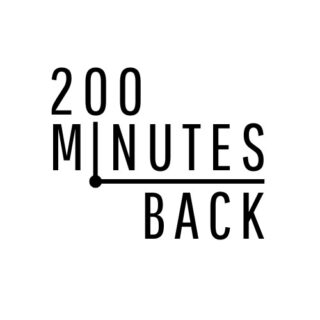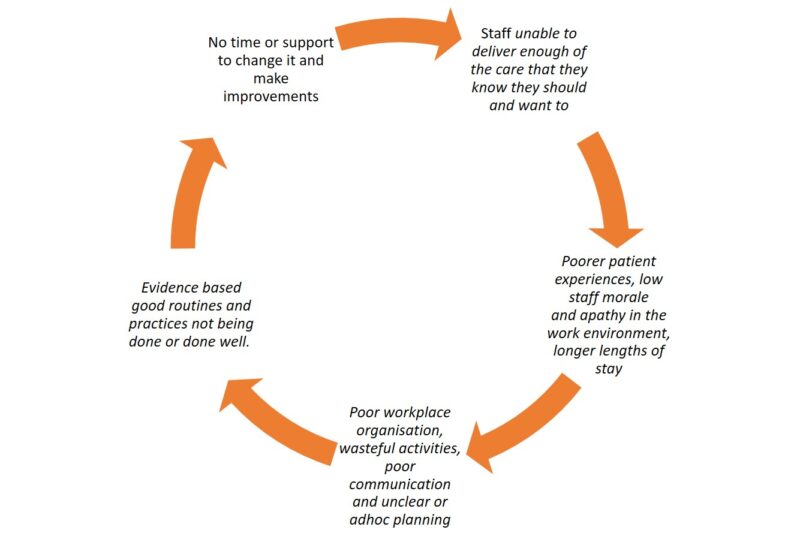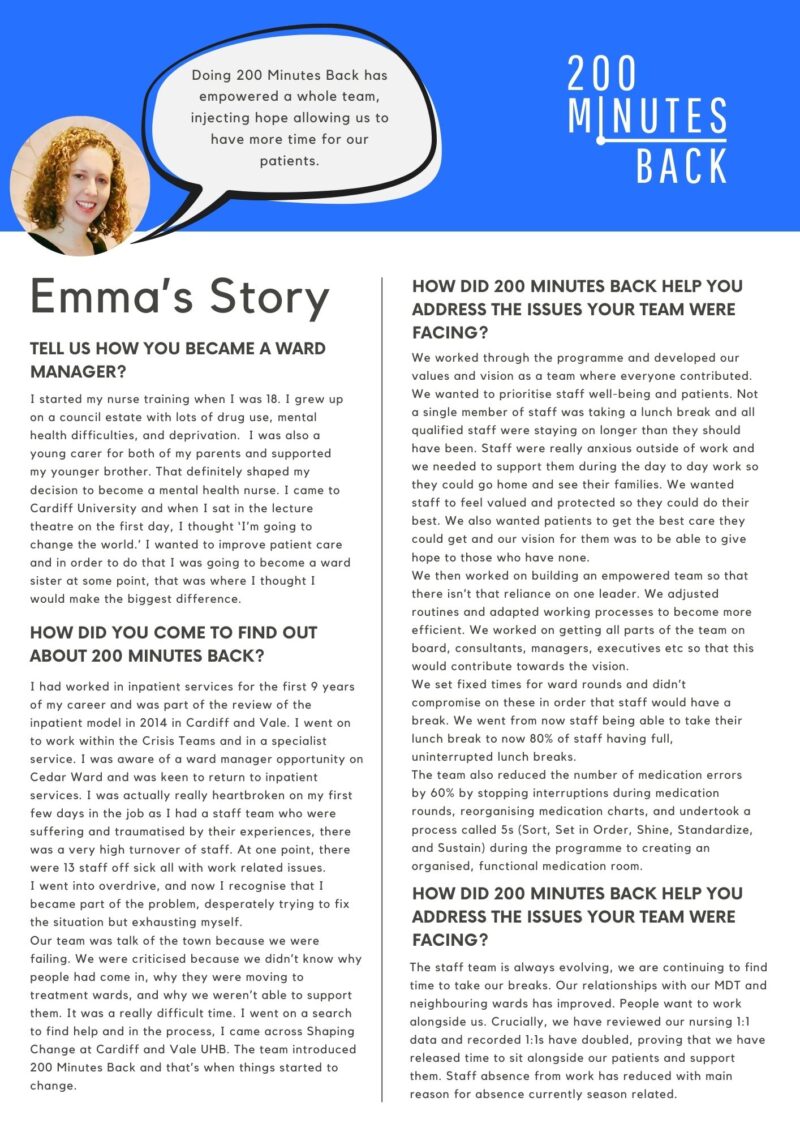Q Exchange
200 Minutes Back
- Proposal
- 2024

Meet the team
Also:
- Nick Tyson
- Chloe Chettleburgh
- Jade Barber
- Emma Powderhill
- Stephanie James
- Cathryn Saunders
- Rachael Heycock
What is the challenge your project is going to address and how does it connect to the theme of 'How can we improve across system boundaries?
At CAVUHB, staff strive to deliver compassionate care, but often find themselves unable to do so directly alongside patients. Often expressing they are ‘losing the passion to care’. Workplace disorganisation, wasteful activities, and unclear communication contribute to limited direct care —typically only 45% is direct care. Resulting in diminished patient experiences, weary staff morale, and missed opportunities for evidence-based routines.

To break this cycle, the Releasing Time to Care approach was tested. Facilitators collaborate with teams, exploring seven elements of improvement. In areas where it has been implemented, there has been a 10 to 15% increase in direct patient care.
Positive feedback confirms that the cycle can be broken. A team from CAVUHB and CTMUHB recognised that local facilitators, familiar with specific areas, have been instrumental in driving change. As a result, RT2C has evolved into 200 Minutes Back, a campaign that empowers teams through self-assessment, resources, and community support
What does your project aim to achieve?
By the end of 2026, every ward and patient facing clinical area across Southeast Wales will have used and benefited from 200 Minutes Back.
All clinical staff working in the areas that have used and benefited from the 200 minutes back programme will get approximately 200 minutes of their time back to be able to deliver care directly to and with the patients they are providing care to. This will come from:
- Reduced waste and developing more effective and efficient ways of working.
- Embedding and sustaining routines and practices that ensure key tasks and activities are reliably and consistently delivered. These are made up of clinical, operational, and importantly around growth and development of the team
- Providing easy to use tools and techniques that become a part of the routines and practices which will ensure that improvement is a part of a team’s day to day habits and behaviours.
How will the project be delivered?
The project is to deliver the aims and objectives through:
- The development of an easy-to-use self-assessment tool that enables teams identify and focus on areas for improvement
- The creation of free access guides with tools, templates and media to guide local leaders through the process
- Engaging with organisations across the heath system
The creation and sustainable maintenance of a community through a website where teams can track and share their efforts. - Establishing a Campaign and socialising people’s efforts
- Establishing a learning system that enables the campaign to adapt to changing needs
- A launch event and subsequent network, share, learn and celebrate events
This will be achieved using experts and local champions committed by the engaged organisations to create and establish the campaign and resources.
The key measure of success will be the number of engaged areas and the increased percentage of direct care which will be captured on the website
How is your project going to share learning?
As this is a campaign its success depends on building a community and to do that you have to share openly and socialise everything that is happening, both successes and failures.
The website and social media will be core to that sharing and learning and whilst the initial aim is for South East Wales it will be available to any clinical team in any part of the UK or beyond.
Over the coming years the campaign hopes to be able to share its story many times with the Q community, IHI, Improvement Cymru & others, and show that the core elements are applicable in clinical and non clinical areas
How you can contribute
- Promote the campaign is their areas
- Share their learning from similar experiences and contribute to the community and the development of its learning system
- Share useful tools and techniques that will support teams in their efforts
- We aim to establish an ‘ask an expert’ forum/area on the website, it would be great if Q Community members can contribute to that.
Plan timeline
| 20 Mar 2024 | Continue to build evidence base and case studies |
|---|---|
| 31 Mar 2024 | Creation of self-assessment, guides and tools |
| 1 May 2024 | Design and produce campaign materials |
| 1 May 2024 | Start wider engagement with other health organisations |
| 29 May 2024 | Sharing 200 minutes back stories |
| 30 May 2024 | Creation of website |
| 3 Jun 2024 | Soft launch Campaign and website |
| 24 Oct 2024 | Launch event |
| 24 Apr 2025 | Share event April 2025 |
| 23 Oct 2025 | Share event Oct 2025 |
| 23 Apr 2026 | Share event April 2026 |
| 22 Oct 2026 | Celebration Event 2026 |


Comments
Jonathan Turnbull-Ross 20 Mar 2024
Great idea, and key message of 200mins really help frontline perspectives on what you're trying to achieve.
Looking forward to seeing this develop, and spread across boundaries!
Rachel Trask 7 Mar 2024
Hi Guys - it would be great to learn a little more about this project. Sounds interesting!
Comments are now closed for this post.